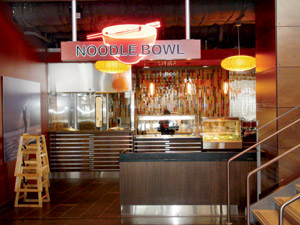Especially in today's economy, businesses recognize that time is money. Despite a slower economic environment, a growing number of companies continue to invest in their business and industry foodservice operations as a way to drive efficiency.
 Asian concepts, like the Noodle Bowl here at Microsoft, and other ethnic options are a growing part of many B&I foodservice operations.In 2009, Microsoft Corp. created the Commons, a 1.4 million-square-foot dining and shopping complex, to further enhance the productivity of its 50,000 employees. In addition to 14 self-service restaurants and a full-service restaurant called Spitfire, the development includes shops as well as a soccer field, hair salon, post office, credit union and bicycle repair shop.
Asian concepts, like the Noodle Bowl here at Microsoft, and other ethnic options are a growing part of many B&I foodservice operations.In 2009, Microsoft Corp. created the Commons, a 1.4 million-square-foot dining and shopping complex, to further enhance the productivity of its 50,000 employees. In addition to 14 self-service restaurants and a full-service restaurant called Spitfire, the development includes shops as well as a soccer field, hair salon, post office, credit union and bicycle repair shop.
"We surveyed our employees to better understand what they were doing when they were not at work," says Mark Freeman, Microsoft's senior manager of global employee services. "We brought all the places they were visiting onto our campus so they could take care of their personal needs and get back to work."
The scope of the company's foodservice operations is massive. In addition to the Commons' restaurants, which seat 2,000 and serve 5,000 meals a day, Microsoft has 43 cafés, a large catering facility that serves more than 700,000 meals annually, and about 30 Espresso Plus coffee stands that also offer salads, sandwiches and desserts.
As part of a lifecycle plan, Microsoft renovates the cafés on a regular basis. At press time, three cafés are being revamped, with completion scheduled for July. During this process, Microsoft has brought in food trucks to compensate for the closed facilities.
"We have 109 buildings, and our foodservice operations are scattered throughout our campuses," Freeman says. "When we started building our cafés, we didn't want anyone to be more than a five-minute walk away."
In 2007 the company initiated a local brands program where restaurants from Seattle and the Pacific Northwest each receive a permanent slot in a Microsoft café. Many of these local restaurants were also given permanent spots in the Commons in place of fast food chains.
Restaurants in the newer complex are varied and include a diner that specializes in burgers, fries, and fish and chips; a pizzeria; a natural foods eatery; a soup, salad and bread concept; and ethnic outlets that offer East Indian fare, Mexican and Southwest entrees and sushi. Pike Place is the complex's self-serve concept modeled after Seattle's famous market. Café staples include a pizzeria, deli, salad bar and grill, and specific formats are built around these variables.
"When purchasing equipment, the most important thing we are looking at is what's new and cutting edge," Freeman says. "We also consider what offers the most value from a usage perspective."
Wood-burning pizza ovens were recently incorporated into the cafés in an effort to provide more theater for customers. "Energy in the space with equipment like the pizza ovens and our gas-fired woks are necessary because they help draw people in. We are now looking to do some things with eco-friendly fryers," Freeman says. "It's important for us to stay ahead of the curve from a technology, as well as an innovation, perspective."
In terms of unique B&I trends, wellness, sustainability and technology have been at the forefront in recent years, according to Freeman. "Wellness is not just about the food aspect, but also connecting health to employees' work and personal life," he says. "Sustainability became popular a couple of years ago and is still relevant. It's interesting talking to people that are only now figuring it out. A lot has to do with purchasing local, which can be challenging in the winter months."
Sustainability is a priority at Microsoft, which was the first corporate account in the United States to be classified as Three-Star Green by the Green Restaurant Association.
Even though it is a top technology innovator, Microsoft is at a disadvantage because the business does not utilize popular social media like Facebook and Twitter to market its foodservice offerings. Instead, these are promoted via the company's internal social media site, Office Talk. "Olivia Delish is a character we developed who provides information on our dining program in a humorous way," Freeman says.
It's Back to Business for B&I Foodservice
Q&A: Damian Monticello, Corporate Foodservice Liaison, Blue Cross and Blue Shield of Florida



